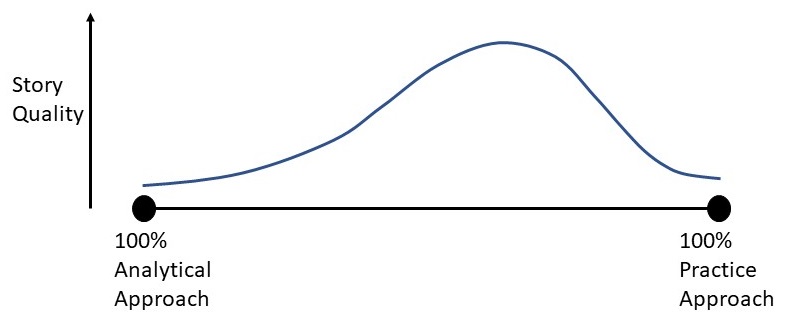What’s the best way to learn how to write stories? Should you just start writing a lot and work to improve? Or should you study the works of the best writers and understand their techniques before setting fingers to keyboard yourself? Or a combination of the two?
A writer friend enrolled in a literary master’s degree program and took a short story workshop class. The instructor told the students to dissect a literary work and analyze it. My friend discovered the entire workshop would consist of these analyses, and suggested to the instructor that students wouldn’t actually learn to write stories that way.
Picking a good metaphor, my friend said you can’t learn to build a house by taking apart other houses and studying them. You have to learn by doing.
The instructor disagreed, leaving my friend dissatisfied with that conclusion to the argument.
Let’s call the instructor’s way the ‘analytical approach’ and my friend’s way the ‘practice approach.’ (Note: I don’t mean to imply my friend only wrote and never read—this student objected to the 100% analytical approach imposed by the instructor.)
Who’s right? Both approaches seen to hold some merit, unless taken to extremes. A person who just analyzes famous writer’s works may develop expertise in analysis but never write a story of value. A writer who never reads seems equally unlikely to produce enjoyable prose.
I envision an experiment performed in two classrooms of second or third graders. One class simply writes stories without prompts. The other spends a year studying high quality children’s literature and discussing those books, and then the students write a story at the end. Which classroom’s students would end up crafting the best stories?

Imagine a line, a spectrum, with the pure ‘analytical approach’ at one end and the pure ‘practice approach’ at the other. My guess is, few of the great authors cluster at either end. They learned to write classic stories by some combination of approaches—by analysis and by practice. Perhaps an optimum exists on that curve, and I suspect it’s past the midpoint, toward the ‘practice approach’ end.
We might gain further insight on this by considering the artificial intelligence program ChatGPT. You may ask this chatbot to write a short story, and even prompt it with a subject, setting, mood, and style. The program will produce a short story for you in minutes.
How does ChapGPT do that? From what I’ve read, ChatGPT’s developers gave the chatbot many, many such prompts, graded the results, and provided feedback to the program regarding the grades. This seems analogous to the practice approach.
To produce a short story for you, ChatGPT scours the internet for information about the words in your prompt (for example, the subject, setting, mood, style, or other parameters you provided). That research seems analogous to the analytical approach.
Thus it appears ChatGPT learned to write short stories by some combination of approaches, someplace between the ends of the spectrum.
Note: ChatGPT does much more than write short stories. I don’t mean to sell it short. It also writes poems, essays, the answers to questions, and accomplishes many other tasks involving text.
In the end, my friend learned little about how to write a short story from the course. The analysis of classic short stories seemed, to my friend, better suited to undergraduate or even high school level, rather than a master’s degree course.
When learning to build a house, examining other houses helps, but so does building one yourself, and that’s similar to learning to write.
An appropriate mix of the analytical and practice approaches seems the best choice, at least for—
Poseidon’s Scribe

